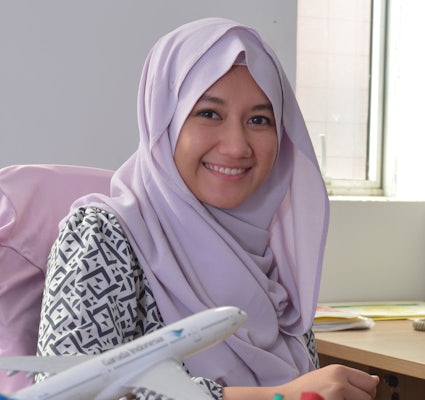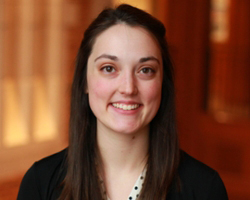CEMB student Ramahdita named finalist in Reach Out SciComm Slam
Ghiska Ramahdita will continue on to compete in the finals May 4, 2021

Ghiska Ramahdita, a doctoral student in The Center for Engineering MechanoBiology (CEMB) in the McKelvey School of Engineering, was named the judges’ choice winner of the National Science Foundation’s Science and Technology Centers Reach Out Challenge semifinal round, hosted by the Museum of Science in Boston.
Using captivating imagery, videos and props, Ramahdita succinctly described her research about the effects of stiffening in heart tissues to a panel of science communication experts and a broad virtual audience. She will continue on to compete in the finals at 7 p.m. May 4, 2021 EDT. Register HERE to watch the final round.
Ramahdita is a second-year doctoral student in mechanical engineering and works in the labs of Nathaniel Huebsch, assistant professor of biomedical engineering, and Guy Genin, the Harold and Kathleen Faught Professor of Mechanical Engineering. Her research interests lie in mechanobiology in iPSC-engineered heart muscle. She is particularly interested to investigate how the mechanical factors, such as stiffness, affect the physiology of tissue, including in heart muscle with predispositions to arrhythmia.
Ramahdita is a James V. & Mary E. Wertsch Fellow of the McDonnell International Scholars Academy. She graduated from Universitas Indonesia with a bachelor’s in engineering and earned master's degrees from INSA de Lyon-France and Universitas Indonesia.
The Reach Out Science Slam is a nationwide effort to boost the communication skills of students and early-career researchers affiliated with the National Science Foundation’s 12 flagship Science and Technology Centers. CEMB is an STC that is a collaboration between Washington University in St. Louis and the University of Pennsylvania.
Competitors of the Reach Out Science Slam are required to make their science stories suitable for family audiences and include a live presentation component. Entrants are encouraged to make presentations engaging by incorporating demonstrations, animation, props and music.
Kari Miller, a fourth-year CEMB doctoral student in the plant and microbial biosciences program (DBBS) in the lab of Elizabeth Haswell, professor of biology and a Howard Hughes Medical Institute-Simmons Faculty Scholar, also competed in the semi-final round.
Click on the topics below for more stories in those areas
- Graduate Students
- Women & Engineering
- Biomedical Engineering
- Mechanical Engineering & Materials Science






